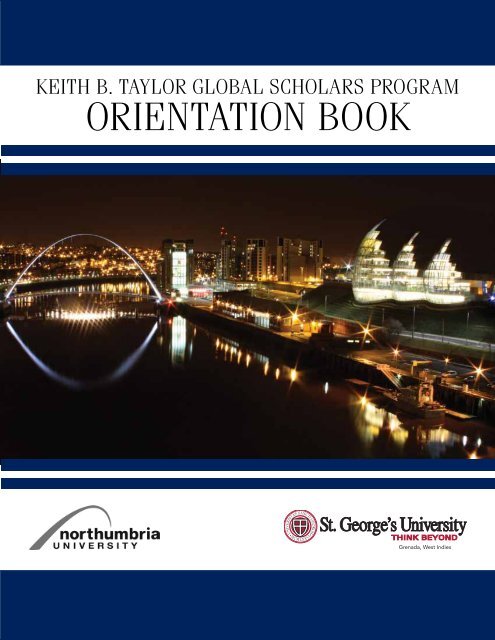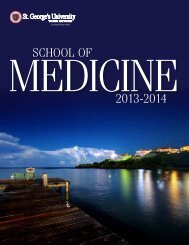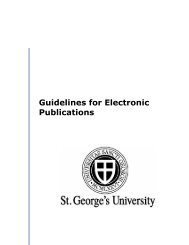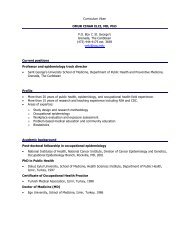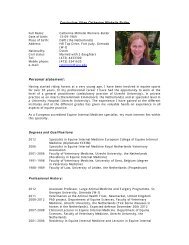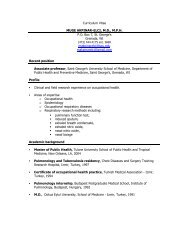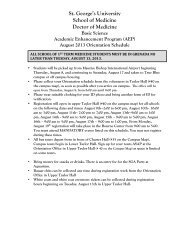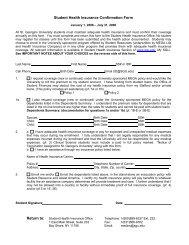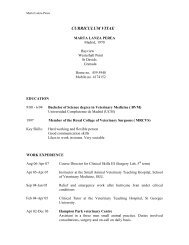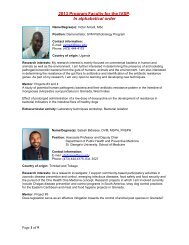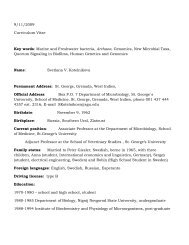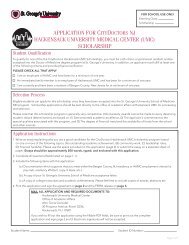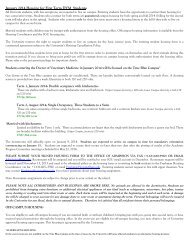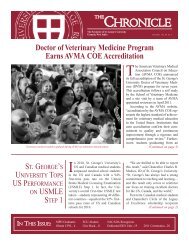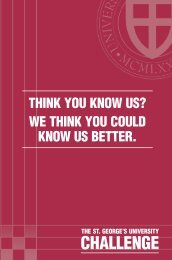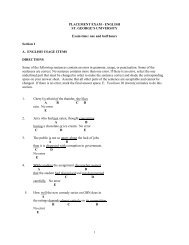Orientation Book 2013-14 - St. George's University
Orientation Book 2013-14 - St. George's University
Orientation Book 2013-14 - St. George's University
You also want an ePaper? Increase the reach of your titles
YUMPU automatically turns print PDFs into web optimized ePapers that Google loves.
Keith B. Taylor Global Scholars Program<br />
<strong>Orientation</strong> book
Table of Contents<br />
Welcome ......................................................... 2<br />
Important Websites and Contact Information ........................... 4<br />
<strong>Orientation</strong> ........................................................ 5<br />
Prior to Arrival on Campus ........................................... 6<br />
Pre-Departure Checklist ............................................. 9<br />
Preparation, Travel, and Arrival. ...................................... 10<br />
What to Pack. ..................................................... 11<br />
Welcome to Newcastle and the United Kingdom ....................... 13<br />
Local Transport Information ......................................... 15<br />
About Northumbria <strong>University</strong> ....................................... 16<br />
Upon Arrival on Campus ............................................ 18<br />
Health ........................................................... 19<br />
Banking .......................................................... 24<br />
Housing .......................................................... 25<br />
Campus Life and Services .......................................... 26<br />
Day-to-Day Life in the United Kingdom ............................... 28<br />
Religion .......................................................... 32<br />
1
Welcome<br />
Letter from the Dean of <strong>St</strong>udents, <strong>St</strong>. George’s <strong>University</strong><br />
On behalf of the Office of the Dean of <strong>St</strong>udents, I wish to congratulate you on your acceptance to the<br />
<strong>St</strong>. George’s <strong>University</strong> Keith B. Taylor Global Scholars Program. As a medical student pursuing advanced educational,<br />
research, and professional opportunities, we are here to facilitate your transition to campus life.<br />
As part of welcoming all new students, Northumbria <strong>University</strong> and <strong>St</strong>. George’s <strong>University</strong> have organized an<br />
extensive orientation program. A formal reception on campus is arranged for all students; for students arriving by air,<br />
this includes reception and transportation to the campus from the airport. I encourage all students to participate in<br />
walking tours of the campus, familiarizing yourself with the many opportunities provided to you.<br />
We encourage you to not only work hard, but make time to socialize and play. A balance of all three will help ensure<br />
your academic and professional success as well as providing a pleasurable and rewarding campus experience.<br />
Wishing you all success!<br />
C.V. Rao, PhD<br />
Dean of <strong>St</strong>udents, <strong>St</strong>. George’s <strong>University</strong><br />
2
Letter from the Director of <strong>St</strong>udent Services, Northumbria <strong>University</strong><br />
A very warm welcome to you as you prepare to come study at Northumbria <strong>University</strong> in the city of Newcastle<br />
upon Tyne.<br />
As you begin your preparations to join us, the staff at Northumbria <strong>University</strong> are getting ready to receive and<br />
welcome you.<br />
It is important to us that your experience as a student at Northumbria <strong>University</strong> is a worthwhile and enjoyable one.<br />
During your time here, you will come into contact with new people, new surroundings, new cultures, and the joys and<br />
rigors of academic study.<br />
This journey also brings with it some exciting challenges. We are here to help you meet these challenges, from your<br />
arrival through to the successful completion of your coursework and helping you to make decisions about your<br />
future. We have put together this information booklet to help you identify the different ways in which you can access<br />
guidance and support during your time here.<br />
We very much value the contribution you and other international students bring to the life and work of the university<br />
community, and I offer you my best wishes for a successful and happy time here at Northumbria.<br />
Levi Pay<br />
Head of <strong>St</strong>udent Support & Wellbeing, Northumbria <strong>University</strong><br />
3
Important Websites and Contact Information<br />
<strong>St</strong>. George’s <strong>University</strong><br />
Northumbria <strong>University</strong><br />
Entry Clearance (Visas) for <strong>St</strong>udents<br />
Newcastle International Airport<br />
Heathrow Airport<br />
London Transport<br />
Trains in the United Kingdom<br />
Newcastle City Council<br />
British Council <strong>St</strong>udying<br />
in the United Kingdom<br />
Insuring Your Possessions<br />
Advice for International <strong>St</strong>udents<br />
NHS Direct (24 Hours)<br />
National Health Service<br />
Meningitis Trust<br />
sgu.edu<br />
northumbria.ac.uk<br />
Tel: +44 (0) 191 232 6002<br />
ukvisas.gov.uk<br />
newcastleairport.com<br />
Tel: 08718821121<br />
baa.co.uk/main/airports/heathrow<br />
Tel: 08443351801<br />
tfl.gov.uk<br />
nationalrail.co.uk or thetrainline.com<br />
newcastle.gov.uk<br />
educationuk.org<br />
niche.endsleigh.co.uk<br />
ukcisa.org.uk<br />
Tel: 08454647 (being phased out); 111 (new)<br />
nhs.uk<br />
meningitis-trust.org<br />
Faculty of Health and Life Sciences Tel: + 44 (0)191 227 4721<br />
Telephone Number<br />
Northumbria <strong>University</strong> <strong>St</strong>udent Support<br />
northumbria.ac.uk/ssw<br />
and Wellbeing Services Tel: +44 (0) 191 227 4127<br />
KBTGSP Emergency Number Tel: +44 (0) 798 247 1181<br />
KBTGSP Office Number (9:00 am–5:00 pm GMT) Tel: +44 (0) 191 227 4854<br />
4
<strong>Orientation</strong><br />
<strong>Orientation</strong> is a time to get acclimated to your physical surroundings, and it<br />
is also a perfect time to meet other new students, upperclassmen, faculty,<br />
and staff. It is a time for making new friends and familiarizing yourself with<br />
all of the great opportunities that await you as you begin your medical<br />
education.<br />
Whether you are new to the United Kingdom or are a citizen with a lifetime<br />
of British experience to share with new friends, please plan on participating<br />
in the many activities planned to welcome you to the campus. These<br />
activities will introduce you to the wonderful community that exists at<br />
both <strong>St</strong>. George’s <strong>University</strong> and Northumbria <strong>University</strong>, and serve to<br />
demonstrate which areas will permit you to explore your own individual<br />
interests and talents, enriching your experience, as well as the experiences<br />
of those around you.<br />
It is mandatory to attend all events, as indicated on the schedule, as important information will be presented that all<br />
students are responsible for knowing. Transportation and/or directions will be provided to facilitate your participation<br />
in all necessary events.<br />
<strong>Orientation</strong> Office/Academic Office<br />
The <strong>Orientation</strong> Office is located at Drill Hall on the City Campus of Northumbria <strong>University</strong>. Upon arrival at your<br />
dorm, an <strong>Orientation</strong> Welcome Pack will be in your room. This will contain literature on the local area, Northumbria<br />
<strong>University</strong>, and other important informations so do make sure you read through it. A light snack will also be in your<br />
room upon your arrival. Please consult the orientation schedule for exact locations for the current term.<br />
Before arrival on campus, be sure to check your student self service account to ensure that you have been cleared for<br />
registration check-in. If you have not been cleared, please go to the Academic Office at the Drill Hall on City Campus<br />
for assistance. You must be clear of any holds before proceeding with registration.<br />
Convocation<br />
All students are required to attend the <strong>University</strong> Convocation. This assembly welcomes new members of the<br />
<strong>University</strong> community and introduces them to the <strong>University</strong> deans, administrators, and student support services.<br />
These are the offices responsible for academic, financial, and institutional policies and procedures.<br />
White Coat Ceremony<br />
Each term, a White Coat Ceremony is held for the School of Medicine. This ceremony marks students’ entry into the<br />
noble profession of medicine. You should wear professional attire for this occasion.<br />
5
Please aim to arrive in time for the <strong>University</strong>’s Meet and Greet Program. The Meet and Greet Program offers new<br />
international students assistance on arrival to Newcastle and free transport to their accommodation. In order to<br />
participate in the Meet and Greet Program, you must advise your admission counselor of your travel plans.<br />
Prior to Arrival on Campus<br />
1. The following items must be returned to the Office of Admission:<br />
a. Deposit<br />
b. Housing form<br />
c. Acknowledgement of Admission form<br />
d. Pre-Registration materials, which will include:<br />
i. Electronic Honor Code<br />
ii. Electronic Entering <strong>St</strong>udent Questionnaire<br />
iii. MCAT Release Form, if applicable<br />
e. Missing admission documentation such as official final transcripts and official test results.<br />
2. Financial Aid Package: All required paperwork for loans and/or scholarships must be completed and returned as<br />
soon as possible to ensure proper allocation of funds. If you have outstanding financial aid issues, they must be<br />
cleared prior to arrival on campus.<br />
3. Follow the payment schedule according to monies due until loans are approved.<br />
The Office of <strong>St</strong>udent Finances and Office of Financial Aid are two separate offices and perform two distinct functions.<br />
a. <strong>St</strong>udents with questions about bills, payments, or refunds should direct inquiries to:<br />
Office of <strong>St</strong>udent Finances<br />
<strong>University</strong> Support Services, LLC<br />
3500 Sunrise Highway; Building 300<br />
Great River, NY 11739<br />
Telephone: +1 (631) 665-8500, ext. 9 1289<br />
Facsimile: +1 (631) 665-7098<br />
Email: billing@sgu.edu<br />
b. <strong>St</strong>udents who have other inquiries about the cost of attendance, loans, or scholarships should direct<br />
inquiries to a financial aid counselor at:<br />
Office of Financial Aid<br />
<strong>University</strong> Support Services, LLC<br />
3500 Sunrise Highway; Building 300<br />
Great River, NY 11739<br />
Telephone: +1 (631) 666-9485<br />
Facsimile: +1 (631) 666-9162<br />
Email: faid@sgu.edu<br />
6
4. Enroll in or waive the SGU sponsored student health insurance plan.<br />
5. Submit completed health history forms according to instructions on the website.<br />
For those traveling by air, train, or bus to Newcastle:<br />
6. Travel Plans: Please contact your admission counselor with airline, flight number, date, and time of arrival. If arriving<br />
by train or bus, please provide trip details, including departure and arrival details in Newcastle. Arrangements will<br />
be made to meet, greet, and transport you from Newcastle International Airport, as well as train and bus terminals.<br />
7. Passport: A passport is required. If you do not have a passport, you should apply immediately. Non-US citizens and<br />
permanent residents intending to travel to the United <strong>St</strong>ates for vacation or travel purposes should obtain visas for<br />
return to the United <strong>St</strong>ates.<br />
8. Entry Clearance: In all cases, if you are coming to study in the United Kingdom, and you are not an EEA national, you<br />
should obtain entry clearance (visa) as a student from your nearest British Embassy, High Commission, Consulate, or<br />
online at visa4ukfco.gov.uk.<br />
You will need to demonstrate that:<br />
• You have been accepted for a full-time program of study (you will need an original up-to-date offer letter<br />
from the <strong>University</strong>)<br />
• You are able and intend to follow the program of study (you may be asked questions on why you want to<br />
study in the United Kingdom, as well as details about the course)<br />
• You have enough money to pay <strong>University</strong> fees and living expenses (you will need bank statements, and/or<br />
sponsorship documents, plus evidence of any payments for your tuition that you have already made)<br />
• You intend to leave the United Kingdom at the end of your studies (you may be asked questions about the<br />
benefit your studies will have on your return home)<br />
9. In certain cases, you may also be asked to provide a health certificate.<br />
10. There is a fee charged for extending the period for which your visa is issued. You should try to ensure that your visa<br />
covers the full period of your intended stay in the United Kingdom.<br />
11. If you are traveling to the United Kingdom via Amsterdam or another international airport outside of the United<br />
Kingdom, you may need a ‘Transit’ visa. Please check with the embassy of the ‘transit’ destination in your home<br />
country regarding whether or not you will require a visa.<br />
12. The <strong>University</strong> supplies students with verification of enrolment (bona fide student letters). Bring this letter with you;<br />
you may need it.<br />
Please ensure that you have been given a STUDENT visa;<br />
mistakes often cannot be rectified once you are in the United Kingdom.<br />
7
13. You should keep some items with you in a folder in your bag or carry-on luggage. Do not put these items in your<br />
checked luggage, as during heavy travel periods your luggage may take a detour. Additionally, many of these items<br />
are required at check-in for your flight (Please see Pre-Departure Checklist).<br />
15. Luggage: All airlines have guidelines for the number, weight, shape, and size of carry-on and checked baggage.<br />
Make sure your carry-on does not exceed the size limitations. You will be charged for additional weight.<br />
• American Airlines has a “box embargo,” meaning that nothing can be brought in a cardboard box; find a<br />
duffel bag or some other luggage to put the box into.<br />
• British Airways considers a purse or laptop case a piece of hand luggage. If you have an additional carry-on,<br />
you will need to put your purse or laptop case inside of it to board the plane.<br />
• Remember to contact the airline of your choice for details before leaving for the airport. Call the particular<br />
airport of departure for this information. General airline numbers may not provide accurate information.<br />
• Contact the British Embassy, High Commission, or Consulate in your country to find out what you can and<br />
cannot bring into the United Kingdom (for example, foodstuffs) or find information for travelers entering the<br />
United Kingdom at hmrc.gov.uk/customs.<br />
Don’t forget to check with the airline for<br />
specific regulations concerning baggage limitations.<br />
8
Pre-Departure Checklist<br />
Make sure you have made all arrangements for:<br />
• Immigration (includes obtaining passport and any visas that may be required)<br />
• Travel<br />
• Money to cover both short-term and long-term expenditure<br />
• Health insurance coverage<br />
• Chest x-ray (if applicable)<br />
• Record of vaccination history<br />
• Medical/dental check-up<br />
• Travel insurance<br />
• Personal belongings insurance (although this can be arranged upon arrival)<br />
• Passport photos, a few of which will be required at the start of term<br />
• Banking: Ask your home bank about transferring money and obtain a reference letter from them; this may help you<br />
in setting up a UK bank account<br />
In your hand luggage (labeled with your name and address in Newcastle), pack the following items:<br />
• Your travel tickets<br />
• Passport, as well as any student and transit visas necessary<br />
• ID from your home country bearing your home address<br />
• <strong>University</strong> letter (original) of unconditional acceptance into a full-time program of study<br />
• Confirmation of your accommodation including full address and telephone number<br />
• Documentary evidence that you can meet the cost of your program of study and your living expenses (for<br />
example, evidence of a scholarship, sponsorship, or banker’s draft)<br />
• Travel insurance documents<br />
• Evidence of a recent medical check-up and chest x-ray (if recommended on the application for your visa)<br />
• Cash in notes and coins for buying bus, train, and metro tickets; Traveler’s checks or credit/debit cards to use while<br />
waiting to set up a bank account<br />
• CPR/First Aid certification cards, if applicable (If you are currently CPR/First Aid certified, be sure to bring your cards<br />
with you. Certification is required for all medical students. Certification is provided by he School within the first<br />
couple of weeks in the term, but a fast track alternative is offered for students with current certification.)<br />
• Any prescription medications, with a letter of explanation from your physician<br />
Upon arrival in Newcastle, you will be met and taken to your accommodation.<br />
• Ring the emergency number (07982 471181) if you are delayed<br />
• Let your family and friends know of your safe arrival<br />
• Attend the orientation program<br />
9
Preparation, Travel, and Arrival<br />
At the Airport<br />
Most international students enter the United Kingdom via Heathrow or Gatwick Airport. We recommend that you<br />
travel by air onto Newcastle International Airport if you land at one of these airports. It is also possible to fly to<br />
Newcastle via an international airport such as Amsterdam, Paris or Berlin.<br />
At passport control, you will need to show your passport, your entry clearance (visa), your offer letter from the<br />
<strong>University</strong>, and possibly your bank statements. Please ensure that these documents are in your carry-on luggage. You<br />
should explain to the immigration officer on duty that you are entering the United Kingdom to study and show him/her<br />
evidence in the form of your offer letter. The immigration officer may request that you undergo a medical examination<br />
and chest x-ray. This is a formality and nothing to get too concerned about.<br />
Allow plenty of time for onward connections to Newcastle; there are often queues at passport control. Once you arrive<br />
in Newcastle and have gone through customs, you will be greeted by the <strong>Orientation</strong> Team members of Northumbria<br />
<strong>University</strong> and accompanied to your accommodation.*<br />
If you encounter travel difficulties while en route, call the following emergency number: 07982 471181<br />
If you have any questions before leaving, please call your admission counselor:<br />
US/Canada: 1 (800) 899-6337, ext. 9 1210<br />
United Kingdom: 0800-1699061, ext. 9 1210<br />
All others: +1 (631) 665-8500 ext. 9 1210<br />
Registering with the Police<br />
The sticker or stamp that the immigration officer or entry clearance officer puts in your passport will also tell you<br />
whether or not you have to register with the police. Currently nationals of the following countries or territories are<br />
required to register with the police:<br />
Afghanistan, Algeria, Argentina, Armenia, Azerbaijan, Bahrain, Belarus, Bolivia, Brazil, China,<br />
Colombia, Cuba, Egypt, Georgia, Hong Kong, Iran, Iraq, Israel, Jordan, Kazakhstan, Kyrgyzstan, Kuwait,<br />
Lebanon, Libya, Moldova, Morocco, North Korea, Oman, Palestine, Peru, Qatar, Russia, Saudi<br />
Arabia, Sudan, Syria, Tajikistan, Tunisia, Turkey, Turkmenistan, United Arab Emirates, Ukraine,<br />
Uzbekistan, and Yemen.<br />
If you are required to register with the local police, please come to the Academic Office in Drill Hall or visit an<br />
international student advisor in <strong>St</strong>udent Services where you will receive more information on how to do this.<br />
Note: Registration is within seven days. The form is available from the Academic Office.<br />
*If, due to a miscommunication, someone does not meet you at the airport, take a taxi to your accommodation address (Winn <strong>St</strong>udios Residence, 17 <strong>St</strong>oddart <strong>St</strong>reet,<br />
Newcastle upon Tyne. NE2 1AN) and save the receipt.<br />
10
What to Pack<br />
Most of the items listed below are widely available in Newcastle at reasonable prices. You may choose to pack some or<br />
all of these items, particularly if there are specific brands that you prefer from home.<br />
School Supplies<br />
• <strong>St</strong>urdy backpack (Something that can survive four months of hauling heavy textbooks around)<br />
• Notebooks, pens, paper, highlighters, 2-inch binders, colored pens, pencils (no. 2 for exams), index cards, three-ring<br />
binders and three-ring hole punch if you prefer (usually only two-ring binders are sold in the United Kingdom)<br />
• Ear plugs for studying and sleeping (These may also be purchased at Boots the Chemist or most pharmacies)<br />
• Day planner<br />
• Personal calculators with square root function (Expensive calculators are unnecessary for undergraduate, graduate,<br />
veterinary medical, and medical students)<br />
• Medical students need lab coats and scrubs<br />
Clothing<br />
• Adequate wardrobe for four months of campus life<br />
• Comfortable walking shoes, sneakers, rain boots, flip-flops for showering at the gym<br />
• Warm coat, light jacket, waterproof jacket<br />
• Plenty of layering pieces (Sweatshirts, sweaters, and so forth)<br />
• A jacket/tie or dress/skirt for the White Coat Ceremony<br />
• Professional attire during clinical skills or when representing the <strong>University</strong> at events<br />
• Dress is casual in Newcastle; however, people do get dressed up to go out on the weekends<br />
Daily Health Care<br />
For those coming from outside of the United Kingdom:<br />
• Be sure to have your Health History form completed and submitted to the <strong>St</strong>udent Health Records Department six<br />
weeks prior to registration;<br />
• If you are on any medication, it may be wise to bring enough to last through the semester (Particular medications you<br />
require may not be covered under the NHS);<br />
• Contraceptives are available through the NHS, although you will need a prescription (It is advisable to bring<br />
sufficient supply with you if you want to stay with your particular brand);<br />
• If there are over-the-counter products that you prefer, bring them with you (Brands in the United Kingdom have<br />
different names; for example, Tylenol is called Paracetamol).<br />
Important Miscellaneous Items<br />
Most personal care items, electronics, and housewares listed below are available in Newcastle and are reasonably<br />
priced. In order to comply with luggage restrictions, you may prefer to purchase these items upon arrival. If you decide<br />
to bring electrical equipment with you, make sure it can be compatible with UK standards: 240 volts, 50 hertz, threepin<br />
square plugs.<br />
11
• Hangers, a laundry bag (many students use a duffel bag as both luggage and a laundry bag)<br />
• Power strip/surge protector<br />
• Transformer: For those coming from North America, transformers are essential (The 220 voltage in the United<br />
Kingdom will destroy electrical appliances designed for 110 voltage use. Please note that when purchasing a<br />
transformer overseas, “UK” voltage differs from “European” voltage.)<br />
• Socket converter: Sockets in the United Kingdom are three-pin square sockets<br />
• Sunglasses<br />
• Travel clock<br />
• Telephone, if you are planning to have one installed (Most students now buy a cellular phone once they arrive in the<br />
United Kingdom)<br />
• First aid kit and clippers*<br />
• Sewing kit (scissors,* needle, thread, buttons, pins, and so forth)<br />
• Contact lens supplies or extra pair of eyeglasses/prescription sunglasses<br />
• Specific or preferred brands of toiletries, health, and beauty aids (such as razors,* shampoo, and so forth)<br />
Family Packing<br />
Remember to pack rainproof and warm clothing, including hats, gloves, and scarves. Baby needs are reasonably<br />
priced in Newcastle.<br />
Sport and Recreational Items<br />
Most sporting facilities are available at Sport Northumbria on the NU campus, and sporting equipment is available<br />
for rent. Athletic shoes are recommended. Rollerblades are not recommended due to cobblestones and uneven<br />
pavement.<br />
*If traveling by air, do not carry any sharp items, including nail clippers or aerosol sprays in carry-on luggage; they will be confiscated at the airport. Liquids should be<br />
packed in luggage which is going into the hold, not cabin luggage.<br />
12
Welcome to Newcastle and the United Kingdom<br />
The United Kingdom is made up of four individual countries: England, Scotland, Wales, and Northern Ireland; each<br />
have their own unique heritage and culture. The United Kingdom has a total population of around 63 million people,<br />
around 53 million of whom live in England.<br />
The official language in the United Kingdom is English, although<br />
Welsh and Celtic languages are still in use in certain areas. The<br />
United Kingdom is a multicultural society; it is not uncommon for<br />
a wide variety of world languages to be used in the home and<br />
on the street. English has a number of regional accents, with the<br />
‘Geordie’ accent being widely used in the Newcastle area. Don’t<br />
worry about this; your ears will soon adapt to the different sounds.<br />
Newcastle is a relatively small but culturally and economically<br />
thriving city surrounded by some of the most beautiful<br />
countryside in England.<br />
More than 40,000 students already live here (that’s about one in seven of the population), which makes students pretty<br />
important in the scheme of things.<br />
It’s students who make Newcastle such a vibrant, modern, youthful city, renowned for its nightlife, sport,<br />
entertainment, shops, and, last but not least, its friendliness.<br />
City Center<br />
Newcastle is one of the finest classical cities in Europe, with large areas of the city center made up of buildings listed for<br />
their architectural and historical significance. Just over the River Tyne, Newcastle’s neighbor Gateshead is home of the<br />
Angel of the North, the Millennium Bridge, Baltic Center for Contemporary Art, and the world famous Sage Gateshead.<br />
With several theaters, including the Theatre Royal, home to the Royal Shakespeare Company for a season every year,<br />
cinema complexes, classical music, and dance venues, there’s plenty to do and see. For film fans, the Tyneside Cinema<br />
has earned its national reputation as a leading venue for alternative films.<br />
Music venues include the City Hall, Metro Radio Arena, and Sage Gateshead music center, an outstanding facility for<br />
all kinds of live music and a pioneering center for music education.<br />
Nightlife<br />
Newcastle has lots of bars, restaurants, pubs, and clubs, from the glamorous Quayside and the City Center where you<br />
can find the glass-fronted Gate development, home to a multiplex cinema, and a multitude of restaurants and bars,<br />
to trendy Osborne Road in Jesmond, a perfect place to sit outside in the summer and enjoy a glass of wine. There<br />
are plenty of restaurants and coffee shops to suit all tastes, cultures, and bank balances. Grey <strong>St</strong>reet—as featured in<br />
numerous national adverts—has a fantastic variety of pizzas, pastas, and other great restaurants.<br />
13
Life Science Center<br />
An innovative exhibition combined with working laboratories aims to educate visitors in the origins of life, DNA, and<br />
the human body in a fun, educational, and entertaining way. The center is making a major contribution to the public<br />
understanding of science to raise young people’s interest in science education and assist schools in the region in<br />
developing inspirational science for their students.<br />
Festivals<br />
Newcastle is a city of festivals and entertainment, with local events all year round. There are festivals for comedy,<br />
dance, film, literature, and jazz, which includes the Free Festival of street entertainment and the Irish Festival.<br />
Sports<br />
Sports fans can look forward to football, rugby union, international athletics, professional tennis tournaments,<br />
basketball, ice hockey, and first-class cricket. The city hosts the Great North Run, Europe’s biggest mass-participation<br />
road race with 30,000 runners turning out every September. Of course, there is also <strong>St</strong>. James’ Park, home of Premier<br />
League football club Newcastle United.<br />
Shopping<br />
If it’s retail therapy you’re looking for, Newcastle has one of the most varied and successful shopping centers in the<br />
United Kingdom, which includes great British brands such as Topshop, River Island, All Saints, among hundreds of<br />
others, and Gateshead’s enormous Metro Centre is just across the River Tyne.<br />
All types of food are available in Newcastle.<br />
You will find a wide range of grocery stores,<br />
from gourmet specialty shops to large discount supermarkets.<br />
The most popular stores are Tesco, Morrisons, Sainsbury’s,<br />
and Marks and Spencer.<br />
<strong>14</strong>
Local Transport Information<br />
The Metro is Tyne and Wear’s own light rail system with 60 Metro stations serving Newcastle, Gateshead, Sunderland,<br />
North Tyneside, and South Tyneside.<br />
Metro stations are conveniently located for easy access around Tyne and Wear, situated in the heart of both Newcastle<br />
and Sunderland City Centers. There are also Metro stations located near the main university/college campuses, and<br />
many of the students’ accommodations and student areas.<br />
The Metro is fast, frequent, and a great value, especially for students. There are various ticket options for students, but<br />
perhaps the most cost-effective is the Metro <strong>St</strong>udent Card that is available to buy per semester, entitling students to<br />
unlimited travel, either within the Newcastle and Sunderland areas, or the whole system, depending upon the chosen<br />
option.<br />
Metro <strong>St</strong>udent Cards are available from any Nexus Travelshop. Call Traveline at 08712002233 for all passenger<br />
transport information.<br />
Metro and bus information can be found at nexus.org.uk/metro/guide.<br />
15
About Northumbria <strong>University</strong><br />
Northumbria <strong>University</strong> is a large metropolitan university, first established as a<br />
polytechnic institution in 1969, and inaugurated as a university on September 1,<br />
1992. There are just over 32,000 students, of which 3,300 are overseas students.<br />
History<br />
Newcastle Polytechnic was formed in 1969 from the amalgamation of three regional colleges: Rutherford College of<br />
Technology, the College of Art Industrial Design, and the Municipal College of Commerce. These colleges had origins<br />
which were deeply rooted in the region. The practical and vocational training needs of local industry had stimulated<br />
the development of relevant post-school education as far back as the 19th century.<br />
Building on these firm foundations, Newcastle Polytechnic became one of the leading institutions of its type in the<br />
United Kingdom. It became a major center for the initial training of teachers with the incorporation of the City College<br />
of Education in 1974, and subsequently the Northern Counties College of Education in 1976.<br />
In 1976, Newcastle Polytechnic, which already offered nurse training, began occupational therapy and physiotherapy<br />
training. In 1995, the incorporation of the Bede, Newcastle, and Northumbria College of Health <strong>St</strong>udies was<br />
transferred into the <strong>University</strong>.<br />
A book providing a detailed account of the history of Northumbria <strong>University</strong> has been published by Northumbria<br />
<strong>University</strong> Press. Rutherford’s Ladder: the Making of Northumbria <strong>University</strong>, 1871-1996 charts the history of<br />
Northumbria <strong>University</strong> and the academic institutions from which it was created.<br />
Newcastle City Center Campus<br />
The City Center Campus site houses the administrative center of the <strong>University</strong>, the main library, the <strong>St</strong>udents’ Union<br />
Center, and the <strong>St</strong>udent Services Center, as well as the bulk of teaching accommodation.<br />
The City Center campus was the location for an exciting research project, funded with grants from the European<br />
community and from industry. The entire south-facing facade of the Northumberland Building has been clad with solar<br />
panels. The panels are intended to provide a significant portion of the building’s power needs. This experimental use<br />
of potential alternative power sources for city centers is the northern most of its kind in Europe.<br />
The <strong>University</strong> has contributed considerably to the regeneration of Newcastle’s City Center, having refurbished<br />
a variety of old buildings adjacent to or close to its City Campus. These include student accommodation at Garth<br />
Heads, Art Conservation housed in Burt Hall, the state-of-the-art IT and teaching facilities in the Trinity Building (a<br />
deconsecrated church), and Drill Hall. Another example is the old Dental Hospital, a 19th century building which was<br />
renamed Sutherland Building and houses <strong>University</strong> offices.<br />
16
Coach Lane Campus, Newcastle<br />
The suburban campus at Coach Lane, about three miles east of the center, was the home of the Northern Counties<br />
Teacher Training College. The new £18-million campus provides learning and teaching facilities for approximately<br />
5,000 students from the <strong>University</strong>’s teaching, health, and social work-related courses.<br />
The new campus, located on a 27-acre site, incorporates teaching and seminar rooms, staff accommodation, and the<br />
Learning Resources Center, within which library and computing systems will be fully integrated.<br />
The buildings, which blend well into the open space environment of the locality, are predominantly three-story with<br />
some two-story sections. Solar shading is provided to southerly-facing facades to reduce heat gain, and some areas<br />
of glazing have been reduced to minimize traffic and pedestrian noise. The buildings are designed to be heat-efficient<br />
and environmentally friendly. The surrounding area has been attractively landscaped.<br />
Carlisle Campus<br />
In 1992, the <strong>University</strong> expanded into Carlisle via a partnership agreement with the City Council, when the Carlisle<br />
Campus was opened. The resulting refurbishment of listed city center buildings was awarded the British Urban<br />
Regeneration Association’s Best Practice Award for 1995. <strong>St</strong>udents in Carlisle studied programs in business and<br />
management, social sciences, and humanities. In September 2004, ownership of this campus was transferred to the<br />
<strong>University</strong> of Central Lancashire.<br />
17
Upon Arrival on Campus<br />
Registration Check-In<br />
Before departing for the UK, you should have viewed your Self Service <strong>St</strong>udent account to see if you have clearance<br />
for registration check-in. If you have holds on your account, please follow the instructions provided by the Office of the<br />
Registrar.<br />
You will be provided with pre-registration forms that must be completed and submitted prior to arriving on campus. If<br />
you have not done this, you will need to bring these forms with you to check in.<br />
At registration check-in, your clearance status will be verified. Once you are cleared to complete your registration, you<br />
will be given instructions regarding collection of your textbooks.<br />
If you have a physical or learning disability for which you may seek special consideration during matriculation at<br />
<strong>St</strong>. George’s <strong>University</strong>, you must bring appropriate documentation of this condition with you at the start of term<br />
to make an application to the Dean of <strong>St</strong>udents for accommodation. For further guidance regarding this process,<br />
academic accommodations at <strong>St</strong>. George’s <strong>University</strong> and the supporting documentation requirements, please visit<br />
sgu.edu/disabilities.<br />
You will need to enroll onto the Northumbria <strong>University</strong> DipHE Medical Sciences program following instructions<br />
provided by Northumbria <strong>University</strong>. In addition, you will have your photo taken for a Northumbria <strong>University</strong> <strong>St</strong>udent<br />
ID that will also be used to produce a <strong>St</strong>. George’s <strong>University</strong> School of Medicine <strong>St</strong>udent ID. The <strong>St</strong>. George’s School<br />
of Medicine ID will be provided to you within a few weeks from the start of the term. All enrolment takes place in the<br />
Northumbria <strong>University</strong> Library (see your <strong>Orientation</strong> Schedule for specific details).<br />
18
Health<br />
Health Insurance<br />
All <strong>St</strong>. George’s <strong>University</strong>, students must maintain continuous and adequate health insurance, and must confirm<br />
coverage if they opt to waive out of the SGU sponsored program. <strong>St</strong>udents can purchase health insurance privately or<br />
they can purchase the school-sponsored health insurance policy offered through Worldwide Expatriate Association<br />
(WEA). Although students can utilize the UK National Healthcare System, it does not fulfill the requirement for<br />
enrollment in <strong>St</strong>. George’s <strong>University</strong>. NHS coverage is not comprehensive; for example, the NHS does not cover<br />
pre-existing medical conditions or out-of-country medical expenses. <strong>St</strong>udents may enroll in the <strong>University</strong> plan,<br />
which offers comprehensive, affordable health insurance providing a wide range of protection, including major<br />
medical insurance and air ambulance coverage, or enroll in any other program which provides them with comparable<br />
protection. All plan information and instructional information is posted under the <strong>St</strong>udent Services section of MySGU<br />
on the SGU website.<br />
Registering with a General Practitioner<br />
You should register with a local General Practitioner (GP) as soon as possible after you arrive and have a permanent<br />
address. Following registration you will be sent an NHS medical card with an NHS number and you should take this<br />
with you whenever you see your doctor.<br />
The Saville Medical Group, 7 Saville Place, and Lloyd-Jones and Partner, <strong>University</strong> Medical Center, Claremont Road<br />
are both adjacent to City Campus; however, you might prefer to find a GP nearer to where you live.<br />
You will be supplied with a list of local GP in your Welcome Packet, as well as information about local hospitals, walk-in<br />
centers, dental practices, and opticians.<br />
To register, visit the practice during consulting hours, and bring your passport and a letter from the <strong>University</strong><br />
confirming that you are a full-time student.<br />
When you are there, find out what times the surgery is open, and whether you need to make an appointment or can<br />
just drop in. There should also be an out-of-hours number which you can ring if you need medical attention. A doctor<br />
will only visit you at home if you are too ill to leave your bed.<br />
Out-of-Hours Service<br />
Telephone: 111<br />
Emergencies<br />
In a medical emergency, you should either telephone for an ambulance by dialing 999 (the call is free), or get someone<br />
to take you to the nearest hospital. Accident and emergency services are free in the first instance.<br />
19
NHS Direct<br />
NHS Direct is a 24-hour nurse-led telephone service that is free and run by the NHS. It provides information on<br />
diagnosis and treatment of common conditions, as well as gives advice on what to do if you’re feeling ill and not sure<br />
what to do. NHS Direct can also give you details of local services from late-night pharmacists to emergency dentists.<br />
NHS Direct<br />
Telephone: 08454647 (being phased out); 111 (new)<br />
Walk-in Centers<br />
Walk-in centers are nurse-led walk-in medical centers; no appointment is needed. Drugs may be prescribed and you<br />
may also be referred to a specialist, if necessary.<br />
Westgate Walk-In Centre<br />
Westgate NHS Walk-In Centre, Westgate Road, Newcastle upon Tyne, NE4 6BE<br />
Open 8:00 am to 8:00 pm seven days a week<br />
Telephone: 0191 282 3000<br />
Molineux <strong>St</strong>reet Walk-In Centre<br />
Molineux <strong>St</strong>reet, Byker, Newcastle upon Tyne, NE6 1SG<br />
Open 8:00 am to 8:00 pm Monday through Friday<br />
Telephone: 0191 275 5862<br />
Prescription Medicines<br />
If the doctor decides you need medicine, he/she will give you a prescription. Take the prescription to a chemist’s shop<br />
where there will be a pharmacy. You can expect to pay a fixed amount of £7.85 for each medication.<br />
Community Pharmacy<br />
Community pharmacies are open longer than your GP. They are often open on weekends, and may be open late at<br />
night or on a bank holiday. Pharmacists are qualified medical professionals and can give you advice about common<br />
symptoms, medicines, and healthy living.<br />
Dentist Services<br />
You can register with a dentist in the same way you register with a GP. Find a dentist, ring them to check that they offer<br />
NHS treatment, and ask them to add you to their list. You can contact NHS Direct or visit the website to find out which<br />
dentists in your area are accepting new patients. (Note that some dentists only accept private patients who pay for the<br />
full cost of their treatment.)<br />
You need to make an appointment in advance, and you must notify the receptionist if you cannot keep your<br />
appointment, otherwise a cancellation fee may be charged. Almost everyone in the United Kingdom has to pay<br />
something toward the cost of dental treatment, even for regular check-ups. If you are eligible for NHS treatment, you<br />
can receive your dental treatment at a reduced rate.<br />
20
Optician Services<br />
Cost of an eye test varies. There are many special offers from booking online for a free test to a traditional optician<br />
who can charge up to £17.<br />
Meningitis<br />
While in the United Kingdom, you should be aware of a medical condition called meningitis. It is a rare but serious<br />
illness, caused by inflammation of the lining of the brain, and can occur among young people.<br />
While you should not be too concerned about meningitis, you should take the precaution of familiarizing yourself with<br />
the most common symptoms.<br />
Further information on meningitis and its symptoms will be given at the International Induction.<br />
For more information, please go to the Meningitis Trust website, as listed in Important Websites on page 4.<br />
Prenatal Care and Delivery<br />
Pregnancy tests are available through family planning and GP services in Newcastle. Home tests can be purchased at<br />
large supermarkets and the chemist.<br />
Prenatal and maternity care is arranged through your GP, who will refer you to a midwife, and schedule regular hospital<br />
check-ups.<br />
Delivery and obstetrical emergencies are handled in the hospital.<br />
Pregnant individuals seeking air travel may be turned away by an airline after the seventh month of pregnancy due to<br />
increased risk of premature labor. If you will be leaving the United Kingdom for delivery, plan ahead. Call your airlines<br />
about current regulations regarding the transport of pregnant passengers.<br />
Sexually Transmitted Diseases<br />
If you begin a sexual relationship, make sure you understand the risk of catching sexually transmitted diseases and<br />
how to reduce that risk. This is important for both men and women. Some sexually transmitted diseases can be easily<br />
treated with antibiotics, but HIV/AIDS can be life threatening, so make sure you follow advice for reducing the risks.<br />
You can get confidential advice and information from your doctor or specialist drop-in clinics.<br />
AIDS Advice Terence Higgin’s Trust’s National Helpline<br />
Open 10:00 am to 10:00 pm Monday through Friday; 12:00 pm to 6:00 pm Saturday and Sunday<br />
Telephone: 0845 122 1200<br />
Newcastle GUM Clinic<br />
Newcastle Sexual Health Centre and Gum Clinic, New Croft House, Market <strong>St</strong>reet East, Newcastle upon Tyne, NE1 6ND<br />
Telephone: 0191 229 2999<br />
21
Drugs<br />
In the United Kingdom, it is illegal to use controlled drugs except under medical supervision.<br />
If you do use illegal drugs, however, and you develop a problem with substance misuse, please contact one of the<br />
following resources for confidential advice:<br />
Turning Point<br />
Telephone: 0207 481 7600<br />
Frank<br />
Telephone: 0800 776600<br />
Website: talktofrank.com<br />
North East Council on Addictions<br />
Website: neca.co.uk<br />
Alcohol<br />
Anyone over 18 years old can legally buy and consume alcoholic beverages in the United Kingdom.<br />
If you think you might have a drinking problem, you should seek assistance from:<br />
• your student counselor<br />
• your doctor<br />
• Alcoholics Anonymous (Telephone: 0808 802 1221)<br />
• www.neca.co.uk<br />
• www.alcoholconcern.org.uk<br />
Mental Health<br />
When you are away from support networks of family and friends, problems can become harder to deal with. At times<br />
of change, you can become subject to new and unfamiliar feelings that are not always good, and can be painful or<br />
frightening. It is important that you learn how to cope with the ups and downs of university life in a foreign country, but<br />
also know when to seek support from others.<br />
You may be dealing with something which is temporary or associated with a particular circumstance, such as study<br />
stress, or you may have more ongoing long-term difficulties for which you are already receiving treatment. Whatever it<br />
is, you don’t have to go through it on your own. One of the major problems of mental health and emotional problems<br />
is the feeling of isolation, but there are a number of people who are available to help you:<br />
• Guidance Tutors: academic members of staff appointed as individuals you can go to if you are experiencing<br />
difficulties with your studies<br />
• The <strong>University</strong> has a <strong>St</strong>udent Support and Wellbeing Centre, located on the ground floor of the Northumberland<br />
Building on City Campus. The <strong>St</strong>udent Support and Wellbeing Centre is there to provide you with a range of<br />
different types of advice and support, including counselling and mental health support. The <strong>St</strong>udent Support and<br />
Wellbeing Centre is open on weekdays—from 9:00 am–5:00 pm (Monday to Thursday) and 9:00 am–4:30 pm (Friday).<br />
More information about the services available can also be found at northumbria.ac.uk/ssw.<br />
22
Contacts and Links Outside of the <strong>University</strong><br />
Mental Health Matters Helpline<br />
6:00 pm–6:00 am, 7 days a week<br />
Telephone: 0845 601 2457<br />
MINDinfoline<br />
Telephone: 0300 123 3393<br />
Website: mind.org.uk<br />
Samaritans UK National Helpline<br />
Samaritans UK National Helpline offers emotional support through a telephone helpline, email response service, and<br />
face-to-face service located at 15 Portland Terrace, Jesmond.<br />
Telephone: 0845 790 9090<br />
Telephone: 0191 232 7272 (Newcastle Branch)<br />
Website: samaritans.org.uk<br />
Keeping Healthy<br />
The best way to stay healthy is to eat sensibly, exercise regularly, and make sure you get enough sleep. Try to eat<br />
something from each of the following categories every day:<br />
• fresh fruit, vegetables<br />
• bread, potatoes, rice, noodles, pasta<br />
• protein (such as beans, lentils, eggs, fish, or meat)<br />
• dairy (such as milk, cheese, yogurt, or fortified soya products)<br />
Try to get some exercise several times a week. Practice your favorite sport or learn a new one. If you do not like sports,<br />
try an exercise class, go dancing, or go for a long walk.<br />
Traveling to a new country with a different climate and different food can cause small health upsets. You may<br />
develop minor illnesses such as coughs and colds, but don’t be alarmed; such problems are easy to treat. Make an<br />
appointment to see your doctor if you are concerned, or speak to a pharmacist and remember to explain any changes<br />
in lifestyle that might be affecting your health.<br />
Health Care Checklist<br />
• Register with a doctor and dentist as soon as you can.<br />
• Ask your doctor to immunize you against meningitis.<br />
• Eat a balanced diet and get regular exercise.<br />
• If you are worried about your health, talk to your doctor or student counselor.<br />
• Arrange any necessary insurance, either before you leave home or as soon as you get to the United Kingdom.<br />
23
Banking<br />
Opening a bank account should be one of your first priorities after settling into your accommodation. It is important to<br />
discuss with your bank at home how to transfer funds into your UK bank account, as there can be delays when clearing<br />
a personal check drawn on a bank outside the United Kingdom. You will also need to find out how much you can bring<br />
into the country in cash or traveler’s checks and choose which will best suit your needs while remembering the risk<br />
involved with carrying large amounts of cash. Make arrangements well in advance.<br />
The four major UK banks are LloydsTSB, Nat West, HSBC, and Barclays, but there are others like the Royal Bank of<br />
Scotland and Yorkshire Bank. They compete for student accounts, so it’s best to explore the incentives of offers from<br />
each before making a decision. Bank opening hours vary but all are open Monday through Friday from 9:00 am to<br />
4:30 pm, some are open Saturday mornings and all are closed on Sundays. Money can be changed at a Bureau de<br />
Change, usually at a travel, agent or in a store like Marks and Spencer which is open on Sunday. There are also many<br />
cashpoint machines (ATMs) in the United Kingdom where you have access to cash 24 hours a day.<br />
Opening a Bank Account<br />
<strong>St</strong>udent Services publishes a leaflet for international students entitled Opening a Bank Account.<br />
You may find that some banks in your country have links with a UK bank which will simplify the transfer of money and<br />
enable you to use a cashpoint; however, it is unlikely that you will be able to open a bank account prior to your arrival<br />
in the United Kingdom.<br />
To open a bank account in the United Kingdom, you will need a passport and proof of your UK address. You will be<br />
given a form in your Welcome Pack to complete for an ‘introductory bank letter’, please complete the form and return<br />
it to the Academic Office. Banks will ask for confirmation of your address in your home country. Please note that PO<br />
Box addresses or agent’s addresses are not acceptable. Check that you can transfer funds into the account from<br />
outside the United Kingdom, and if you have a credit card, ensure it can be used in the United Kingdom as it’s unlikely<br />
that a UK bank will issue you with one.<br />
Most banks will offer international students only basic banking services, such as paying in and withdrawing cash, and<br />
paying bills by direct debit or standing order. You will be given a cash card so that you can withdraw money from a<br />
cashpoint but only if you have available funds; credit will not be available. If you require more than this you will need to<br />
find a bank that is prepared to extend what is on offer. Investigate different options carefully and then shop around to<br />
find the bank that offers the most advantageous deal.<br />
If you enter the United Kingdom with a large sum, it will be of benefit to open a deposit account on which interest is<br />
paid gross, free of tax. A form will need to be completed to ensure that tax is waived and the bank should be able to<br />
provide this. You can then transfer funds from this account into a current account when necessary.<br />
24
Housing<br />
Winn <strong>St</strong>udios Residence<br />
KBTGSP students will be housed together in the Winn <strong>St</strong>udios Residence building, which opened in September 2011.<br />
All entering students, with few exceptions, are required to live in <strong>University</strong> housing for their entire year in the UK.<br />
Married students may be exempt with authorization from the housing office.<br />
Only a five- to 10-minute walk from the City Campus and a scheduled stop on the Northumbria <strong>University</strong> bus service<br />
(providing free travel to all students and staff between the two Newcastle campuses), Winn <strong>St</strong>udios Residence is a<br />
seven-story apartment building with lift access to all floors that incorporates many green and energy-saving techniques.<br />
KBTGSP students have individual bedrooms in self-contained apartments (flats) for groups of four to 10 students each<br />
with own en suite: shower, toilet and wash hand basin. All bedrooms are furnished with a small double bed (4ft x 6ft<br />
3in), a drawer unit, wardrobe, desk, desk chair, bookshelves and full-length mirror.<br />
Each flat has a shared kitchen/living room equipped with cooker, fridge/freezer, sink, workspace and cupboards,<br />
breakfast bar and stool or table and chairs, sofas, and a coffee table. An iron, ironing board, toaster kettle, vacuum<br />
cleaner, mop and bucket, and dust pan and brush are provided. Residents are responsible for cleaning and need to<br />
provide their own cooking equipment, crockery, and bedding.<br />
There is a launderette and cycle store on-site. The housing fee includes fuel costs and possessions insurance*. Each<br />
room has individual electric panel heaters on manual two-hour timers and each flat has an electricity sub-meter.<br />
Meter readings will be taken periodically. The <strong>University</strong> reserves the right to levy further electricity charges where<br />
consumption is excessive.<br />
<strong>St</strong>udents can connect to the Internet in their room via a cable. The basic level service is included in the rent and<br />
upgrades can be bought from the service provider. Further information can be found at studentcom.co.uk.<br />
Information regarding the Winn <strong>St</strong>udios Residence is available on the Northumbria <strong>University</strong> website at<br />
northumbria.ac.uk/brochure/facilities/acc/halls.<br />
Alternative Housing Options<br />
In the event you are eligible to live off campus, the KBTGSP Housing Liaison can advise you regarding alternative<br />
housing options. This housing is not sponsored by the <strong>University</strong> and students are cautioned to be aware of liability<br />
when entering into a rental agreement.<br />
*For more information see cover4students.com/blockhalls.<br />
25
Campus Life and Services<br />
<strong>St</strong>udents’ Union<br />
The <strong>St</strong>udents’ Union is an organization run by students which represents students on a range of issues. The <strong>St</strong>udents’<br />
Union building is the base for many social activities, special interest societies, and events. Based in the heart of the city<br />
campus, the main <strong>St</strong>udents’ Union building offers a variety of places to eat, bars, and shops.<br />
Every student registered at the <strong>University</strong> has the right to join the <strong>St</strong>udents’ Union free of charge, and in doing so, will<br />
receive a <strong>St</strong>udents’ Union card, offering many discounts in bars, restaurants, shops, and attractions.<br />
The Sports Center<br />
‘Sport Northumbria’ coordinates a huge range of exercise and sporting opportunities on and off campus. The Sports<br />
Center itself is well equipped with sports halls catering to many sports, from table tennis to five-a-side football and<br />
use of fitness suites.<br />
To learn more about ‘Team Northumbria,’ visit nusportcentral.com.<br />
<strong>St</strong>udent Support and Well Being<br />
The <strong>University</strong> has a <strong>St</strong>udent Support & Wellbeing Centre, located on the ground floor of the Northumberland<br />
Building on City Campus. The Centre is there to provide you with a range of different types of advice and support,<br />
including:<br />
• counselling and mental health support<br />
• disability and dyslexia support<br />
• advice about financial issues<br />
• international student support and advice, such as advice on your visa or about living in the UK.<br />
The <strong>St</strong>udent Support and Wellbeing Centre is open on weekdays—from 9:00 am–5:00 pm (Monday to Thursday) and<br />
9:00 am–4:30 pm (Friday). You can also access these services by talking to a member of staff at the Coach Lane Library.<br />
More information about the services that are available can also be found at northumbria.ac.uk/ssw.<br />
The <strong>St</strong>udent Support and Wellbeing teams also organise two specific projects which you might be interested in:<br />
• One Planet is an exciting programme of events and activities for all students organised jointly by <strong>St</strong>udent Support<br />
and Wellbeing and the <strong>St</strong>udents’ Union. Visit mynsu.northumbria.ac.uk/studentactivities/oneplanet1 for more<br />
information.<br />
• Friends International is a student friendship project and a volunteer opportunity which aims to help new<br />
international students make friends with students from all over the world. For more information, visit<br />
northumbria.ac.uk/sd/central/stud_serv/sws/friendsint<br />
26
Library<br />
The main <strong>University</strong> library is on the City Campus, but there is also a library at Coach Lane, catering to the programs<br />
based there. The libraries offer a wide range of services.<br />
For more information, visit northumbria.ac.uk/sd/central/library.<br />
IT Services<br />
Northumbria leads the way in information technology after being named the United Kingdom’s ‘Most IT-Enabled<br />
Organization’ in the Computing Awards. It offers:<br />
• Up-to-date Faculty IT labs with specialist facilities and printing in every lab<br />
• Up-to-date open access IT areas that open early, close late, and are available on weekends, giving you access to a<br />
wide range of standard software including Microsoft Office, statistical software, and bibliographical tools<br />
• Informal IT areas in the <strong>St</strong>udents’ Union, cafes, and Library Learning cafes<br />
• Wireless Network: free, no registration process to connect your laptop to the <strong>University</strong> network and the Internet,<br />
‘hotspots’ all over the campus, wireless printing facilities<br />
• Wireless laptops for loan-use anywhere in the libraries<br />
• Your own Northumbria email account<br />
• A lot more than email with a system based on Microsoft Outlook<br />
• Ample space on a server to store your files<br />
• Online Library Catalogue: See what books are available, what you’ve borrowed, and when it’s due back<br />
• NORA: your library search engine for high-quality academic databases and e-journals selected to support your studies<br />
• Nomad IT access points in foyers for quick checks of your email, timetable information, and so forth<br />
• Work at home with the remote access service<br />
• Help with IT person-to-person and by phone, email, text message, and online<br />
ISoc<br />
ISoc, the Society for UK and international students, is one of the many societies you can join at Northumbria. The<br />
Society is open to all students and organizes trips and events throughout the year to bring students from diverse<br />
backgrounds together.<br />
Karaoke, film evenings, trips to London, the Roman Wall, and Alnwick Castle where the Harry Potter movies were<br />
filmed are just some of the activities which have been organized by ISoc. Why not join them? It costs just £5 to join.<br />
More information on ISoc will be given during orientation.<br />
27
Day-to-Day Life in the United Kingdom<br />
Part-Time Work<br />
<strong>St</strong>. George’s <strong>University</strong> prohibits students from taking on paid work due to the intensive nature of study in the<br />
medical program.<br />
Married <strong>St</strong>udents with Dependents<br />
If you have a husband or wife with you, and he/she holds a dependent’s visa, and your visa is for 12 months or more,<br />
your husband or wife will be allowed to work, providing you are not prohibited.<br />
Day-to-Day Expenses<br />
Day-to-day living costs vary from one individual to another, but you should ensure that you are fully able to support<br />
yourself in the United Kingdom, which may be more expensive than your own country.<br />
What to Expect<br />
A single student is likely to need approximately £600 per month for basic living expenses such as rent, food, and<br />
travel. Married students should allow approximately £760 per month with a further £120 per child if necessary. Prices<br />
will vary according to where you shop and what your individual requirements are, but the following examples may help<br />
you to budget for your stay:<br />
Annual Expenses<br />
<strong>St</strong>ationery £40<br />
Ring binder £2<br />
File dividers £1<br />
Lined paper pad £1.50<br />
Pens £1<br />
Correction fluid £1.25<br />
Highlighter £1<br />
Hole punch £2<br />
<strong>St</strong>apler £2<br />
Clothing £100–£300<br />
(Depending on how much you bring.)<br />
Daily Expenses<br />
Newspaper<br />
25p–£1<br />
Magazines<br />
60p–£3.50<br />
Paperback book £5–£10<br />
Cigarettes £7+<br />
Inexpensive restaurant meal £6.50–£12<br />
Meal on campus £1.50–£5<br />
Coffee £1.50<br />
Tea £1.50<br />
Soft drink £1.20<br />
Spirits per measure £2<br />
Beer per pint £3<br />
Wine per glass £4+<br />
Cinema ticket £5.50–£8<br />
Theatre ticket £10–£30<br />
Concert ticket £5–£30<br />
28
Shopping in Newcastle and Gateshead<br />
Newcastle has excellent shopping facilities, catering to all budgets and requirements. Most large stores are open<br />
seven days a week (9:00 am to 5:30 pm Monday through Saturday with late-night shopping until 8:00 pm on Thursday,<br />
10:00 am to 4:00 pm on Sunday). The Metro Centre in Gateshead has extended hours of operation Monday through<br />
Saturday and similar opening times on Sunday.<br />
In the United Kingdom, shops tend to be referred to by the type of goods they sell. The following list is a useful guide:<br />
Supermarkets: The main products are food, drink, and household goods. Prices are competitive, particularly if you<br />
choose specific brand goods. The leading supermarket chains are Tesco, Asda, Morrisons, and Sainsbury’s with Lidl<br />
and Aldi selling a more limited stock but often very cheaply.<br />
Markets: Main products can be anything from fresh fruit, vegetables, and meat to clothes, household goods, and<br />
children’s toys. They are often held outdoors and usually are cheaper than supermarkets. A good indoor market in the<br />
town center is the Grainger Market (off Grainger <strong>St</strong>reet, near the Monument Metro <strong>St</strong>ation) which is open every day<br />
except Sunday. A market is held on the Quayside every Sunday. This is a good place to buy clothes and household items.<br />
Department <strong>St</strong>ores: Large stores on several floors selling everything from clothes, shoes, and handbags to toiletries,<br />
gifts, furniture, cooking utensils, and electrical goods. Some also sell food (like Fenwick and Marks and Spencer).<br />
Household Goods Shops: Useful if you are looking for cushions, curtains, and bedding. There are a number of<br />
household goods shops in the city center such as Primark, BHS, John Lewis, and Next, all of which sell clothes and<br />
shoes, too.<br />
Clothes Shops: An enormous range to suit every budget, most of which can be found in Eldon Square,<br />
Northumberland <strong>St</strong>reet, New Bridge <strong>St</strong>reet, and Grainger <strong>St</strong>reet. Shop around and take advantage of sales where you<br />
can find large reductions. You can also find bargains at designer outlets like the Royal Quays at North Shields, only a<br />
Metro ride away.<br />
Second Hand Shops: Newcastle has a number of second-hand shops selling clothes, books, furniture, toys, and small<br />
gifts. Another source of second-hand goods is the classified ad section of the local papers, The Evening Chronicle and<br />
The Journal. There are also a number of charity shops in the city selling second-hand goods to raise funds for good<br />
causes (for example, Oxfam and Help the Aged).<br />
Corner Shops: Small shops, often in residential areas, which sell a selection of food, drink, and household items. Their<br />
hours of operation are usually longer than those of shops in the city so they can be invaluable if you forget to buy or<br />
run out of something.<br />
Some other interesting food shops you might like to visit are as follows:<br />
• Brighton Oriental Food <strong>St</strong>ore in Fenham, about three miles out of the city, sells halal meat, spices, tropical<br />
vegetables, and maize flour.<br />
• HiYou Oriental Food Emporium 104–108 Newgate <strong>St</strong>reet Newcastle has a good range of Japanese, Korean, Filipino,<br />
and Thai food. It also has a 70-seater deli serving a wide range of food.<br />
29
• China Town in <strong>St</strong>owell <strong>St</strong>reet is worth a visit; in addition to the restaurants, there are good supermarkets selling<br />
Chinese foodstuffs.<br />
• Holland & Barrett in Eldon Square, sell whole foods, soya products, health foods as well as natural supplements,<br />
vitamins, etc.<br />
• The Grainger Market (as mentioned above).<br />
Currency<br />
The unit of UK currency is the pound sterling. The Euro may be accepted in larger stores in the United Kingdom.<br />
Driving in the United Kingdom<br />
In order to drive a car in the United Kingdom, you must ensure that you have the following:<br />
• an MOT certificate if your car is three years old or more to prove that it’s roadworthy<br />
• adequate car insurance coverage<br />
• a current excise license – road tax<br />
• a valid driver’s license<br />
Wearing seat belts is compulsory for all passengers and drivers. Driving under the influence of drugs or alcohol is strictly<br />
forbidden. If you require any more information about driving in the United Kingdom, visit the following website:<br />
DVLA website<br />
www.dvla.gov.uk<br />
Driver’s License<br />
You may drive on your driver’s license from your own country for up to 12 months from the date you first enter<br />
the United Kingdom. If you require a license beyond that time, you must, during the first 12 months you are in the<br />
United Kingdom, apply for a provisional license, sit a UK driving test, and get a UK license. Please note that there are<br />
variations to this rule for certain nationals; please check with an international student advisor in <strong>St</strong>udent Services upon<br />
your arrival.<br />
Television License<br />
If you use a television or any equipment that can receive a TV signal, such as laptops and mobile phones, you need to<br />
buy a TV license. Check tv-l.co.uk for details about how and where to pay, because if you are caught without a license<br />
you can receive a fine of up to £1000 (not including legal costs). Detector vans regularly check houses to which no<br />
license is issued. The current cost of a license is £<strong>14</strong>5.50 for a color television and £49.00 for black and white.<br />
Telephones<br />
Public telephones in the United Kingdom are either coin- or card-operated. If using a card-operated telephone you<br />
need a credit card or a special phone card. Phone cards can usually be purchased from news agents, post offices, and<br />
supermarkets.<br />
30
Most students find that cell phones are convenient and an affordable way to keep in touch with family and friends.<br />
There are a number of packages available depending on your usage and requirements.<br />
Pay-Monthly Plans: Different monthly tariffs vary in price and usage, and are offered by mobile phone networks or<br />
service providers. A contract is signed, usually for a minimum period of 12 months, and bills are issued monthly.<br />
Pay-As-You-Go Plans: Credit is bought in advance, either direct from the network or in the form of top-up cards which<br />
can be purchased at news agents, high street shops, and supermarkets. Once used up, more credit is bought to ‘topup’<br />
the phone, so no contracts or bills are involved.<br />
There are many telecommunications shops in Newcastle, where you can shop around to find a tariff plan that suits your<br />
needs. Shops such as Carphone Warehouse and Phones 4U can advise on the best service.<br />
Smoking in the United Kingdom<br />
Since July 1, 2007, smoking is prohibited in all public places, including most parts of Northumbria <strong>University</strong>.<br />
31
Religion<br />
All of the major world faiths are worshipped in the large and diverse city of Newcastle upon Tyne.<br />
Chaplaincy and Faith Advice<br />
The chaplains and faith advisors offer pastoral and spiritual support to students and staff of different faiths,<br />
philosophical beliefs and value systems. Everyone and anyone within the <strong>University</strong> is welcome to contact the team,<br />
who are also available to individuals who want to talk to someone in confidence, offering a non-judgmental and<br />
independent listening ear.<br />
The chaplains also organise events and activities each semester, such as lunches, trips and discussion groups, as well<br />
as opportunities for prayer, worship, and spiritual exploration. The team can also provide information on local places<br />
of worship—churches, synagogues, mosques, temples and Gurdwaras—as well as contact details for the <strong>University</strong>’s<br />
student faith societies.<br />
For more information about the Chaplaincy and Faith Advice team, please visit northumbria.ac.uk/sd/central/stud_<br />
serv/chaplaincy or email sv.chaplaincy@northumbria.ac.uk<br />
After you arrive at Northumbria <strong>University</strong>, you are also very welcome to visit the Chaplaincy and Faith Advice Centre<br />
on Floor 4, Wynne Jones Building, City Campus.<br />
Religion in the City<br />
Below are some of the places of worship in the city:<br />
Baha’i<br />
Local Spiritual Assembly of Baha’is<br />
30d Victoria Square<br />
Newcastle upon Tyne, NE2 4DE<br />
Telephone: 0191 273 8011<br />
gatesheadbahais.org.uk<br />
Buddhist<br />
Newcastle Buddhist Centre<br />
Third Floor, 9-11Carliol Square<br />
Newcastle upon Tyne, NE1 6UF<br />
newcastlebuddhistcentre.org<br />
Chinese<br />
Chinese Community Center and Temple<br />
<strong>St</strong>owell <strong>St</strong>reet<br />
Newcastle upon Tyne, NE1 5QN<br />
Telephone: 0191 261 8583<br />
Greek Orthodox<br />
<strong>St</strong>. Andrew’s Church<br />
Newgate <strong>St</strong>reet<br />
Newcastle upon Tyne<br />
Telephone: 0191 251 3632<br />
There are many Anglican, Baptist, Presbyterian,<br />
Methodist, and Pentecostal churches in the city. Please<br />
contact the Chaplaincy for further details.<br />
Telephone: 0191 227 3284<br />
sv.chaplaincy@northumbria.ac.uk<br />
Roman Catholic<br />
The Catholic Chaplaincy<br />
<strong>14</strong> Windsor Terrace<br />
Newcastle upon Tyne, NE1 7RU<br />
Telephone: 0191 239 9527<br />
catholicchaplaincy.org<br />
32
Hindu<br />
Hindu Temple<br />
172 West Road<br />
Newcastle upon Tyne<br />
Telephone: 0191 273 3364<br />
hindutemple.co.uk<br />
Islam<br />
Newcastle Central Mosque<br />
Elswick Road<br />
Newcastle upon Tyne<br />
Telephone: 0191 226 0562<br />
newcastlecentralmosque.com/<br />
Judaism<br />
The United Hebrew Congregation<br />
The Synagogue<br />
Graham Park Road, Gosforth<br />
Newcastle upon Tyne<br />
Telephone: 0191 284 0959<br />
northeastjewish.co.uk<br />
Sikh<br />
Sikh Temple<br />
Tindal Close<br />
Newcastle upon Tyne, NE4 5SA<br />
Telephone: 0191 273 8011<br />
33
<strong>St</strong>. George’s <strong>University</strong>,<br />
<strong>University</strong> Centre, Grenada, West Indies<br />
c/o <strong>University</strong> Support Services, LLC, The North American Correspondent<br />
3500 Sunrise Highway, Building 300<br />
Great River, New York 11739<br />
© <strong>2013</strong> <strong>St</strong>. George’s <strong>University</strong> 06/<strong>2013</strong>-181


